新标准英语第七册201324
- 格式:doc
- 大小:38.50 KB
- 文档页数:2
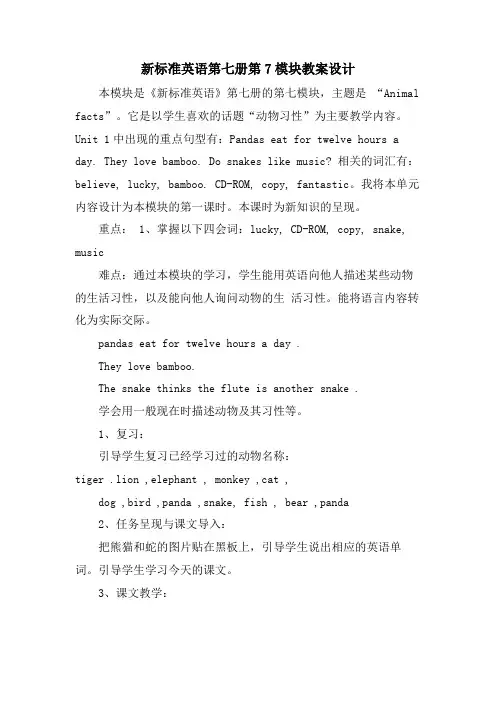
新标准英语第七册第7模块教案设计本模块是《新标准英语》第七册的第七模块,主题是“Animal facts”。
它是以学生喜欢的话题“动物习性”为主要教学内容。
Unit 1中出现的重点句型有:Pandas eat for twelve hours a day. They love bamboo. Do snakes like music? 相关的词汇有:believe, lucky, bamboo. CD-ROM, copy, fantastic。
我将本单元内容设计为本模块的第一课时。
本课时为新知识的呈现。
重点: 1、掌握以下四会词:lucky, CD-ROM, copy, snake, music难点:通过本模块的学习,学生能用英语向他人描述某些动物的生活习性,以及能向他人询问动物的生活习性。
能将语言内容转化为实际交际。
pandas eat for twelve hours a day .They love bamboo.The snake thinks the flute is another snake .学会用一般现在时描述动物及其习性等。
1、复习:引导学生复习已经学习过的动物名称:tiger .lion ,elephant , monkey ,cat ,dog ,bird ,panda ,snake, fish , bear ,panda2、任务呈现与课文导入:把熊猫和蛇的图片贴在黑板上,引导学生说出相应的英语单词。
引导学生学习今天的课文。
3、课文教学:(1)、使用挂图和录音呈现活动1。
在学习前让学生先看一下课文,大致了解故事内容,然后带着老师提出的问题看课文。
(2)、让学生认真听对话,放第一遍录音后向学生提出一些问题:让学生自由组合进展小组讨论,找出答案,教师巡逻指导。
①、Who gives Daming the present ? ②、 What is the present ?③、How long do pandas eat every day ? ④、what do they like to eat ?⑤、Do snakes like music ? ⑥、How does Daming like the CD-RoM?小组长回报,组内成员可补充。
![外研社新标准英语(三年级起点)小学英语第七册教学计划[修改版]](https://uimg.taocdn.com/bca04981f46527d3250ce044.webp)
第一篇:外研社新标准英语(三年级起点)小学英语第七册教学计划外研社新标准英语(三年级起点)小学六年级英语第七册教学计划一、指导思想国家《英语课程标准》要求在英语教学中,继续提倡任务型教学模式,把综合语言运用能力的培养落实在教学过程中,倡导体验、实践、参与、交流和合作的学习方式,实现任务的目标,感受成功,强调学生能用英语做事情。
二、教材分析《小学新标准英语》第七册,共有11个模块,内含一个复习模块,在每个模块均有两个单元,第一单元呈现本模块所要学习的语言内容,第二单元是任务型练习,包括一首歌谣和小诗。
每单元设计了以下几个部分:首先是listen ,point and find。
在这部分学生会看到本单元的基本故事,书中的小朋友在用英语互相交流。
学生要认真听,认真看,理解他们在干些什么,说些什么,然后努力去学着说。
然后是Listen and say。
这部分是对重点句型的练习与巩固。
接着是practise。
这部分设计了一些课堂活动。
学生可以按照书中的范例,运用前面学到的表达方法进行交流,进一步巩固和提高用英语听、说、做、玩、演的技能。
第二单元还专门设计了listen and say.then sing。
在这里,同学们可以结合本单元的内容,唱一唱,说一说,玩一玩,做一做,动动脑筋,使英语学习成为一件快乐的事情。
这学期的教学内容,在继续培养学生的听、说、写的基础上,继续侧重学生阅读理解方面的能力,同时也继续要求学生在写能力方面进行要求,引导学生写出简单的小短文。
继续对出现在每一个模块中的语法点进行形象的,生动的讲解。
做好小学阶段的复习工作。
在复习阶段,应该加大练习量,在复习中提高学生的口头表达和复习重点:三、教学重难点1.能按教学要求掌握所学单词。
2. 能按教学要求掌握所学句型。
3. 能使用日常交际用语,活用四会句型,进行简单的交流,做到大胆开口、发音正确。
4. 能在图片、手势、情境等非语言提示的帮助下,听懂清晰的话语和录音。
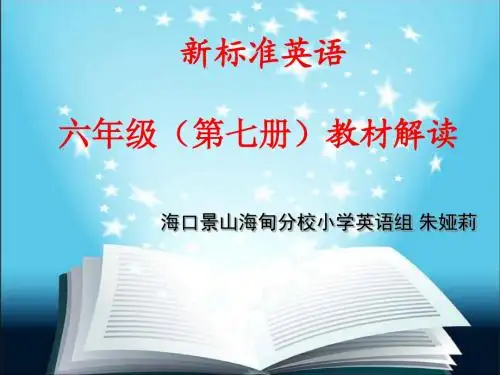
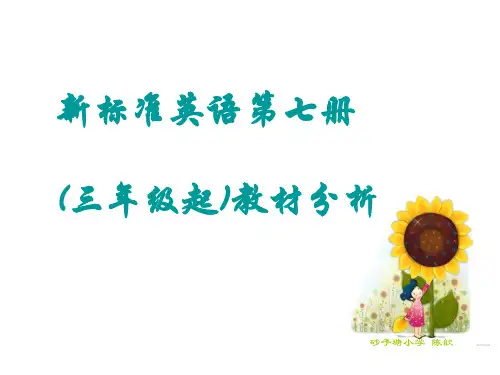
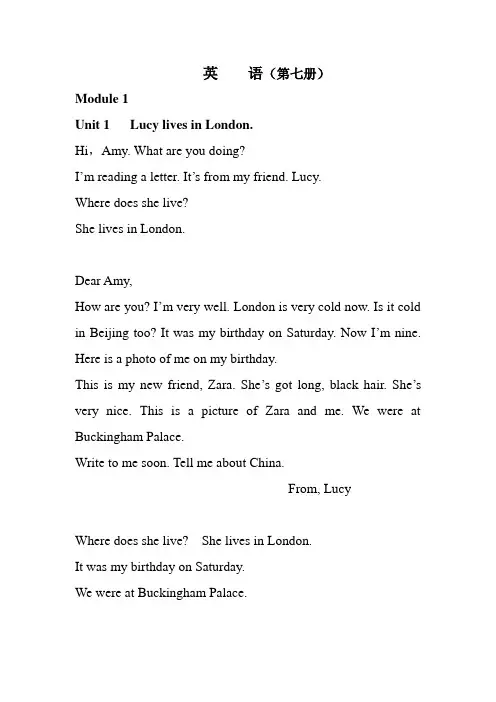
英语(第七册)Module 1Unit 1 Lucy lives in London.Hi,Amy. What are you doing?I’m reading a letter. It’s from my friend. Lucy.Where does she live?She lives in London.Dear Amy,How are you? I’m very well. London is very cold now. Is it cold in Beijing too? It was my birthday on Saturday. Now I’m nine. Here is a photo of me on my birthday.This is my new friend, Zara. She’s got long, black hair. She’s very nice. This is a picture of Zara and me. We were at Buckingham Palace.Write to me soon. Tell me about China.From, LucyWhere does she live? She lives in London.It was my birthday on Saturday.We were at Buckingham Palace.Unit2 I’ve got a new friend.Dear Lucy,Thank you for your letter.Happy birthday to you. I am still eight. I will be nine in April. The weather in Beijing isn’t cold. It’s warm.I’ve got a new friend too. Her name is Lingling. She’s got short, black hair. She’s very nice.Here is a photo of Lingling and me.From AmyDear friends,I am from Mexico. My name is Anita. I like traditional Mexican food and traditional dancing. I also like football and watching TV. What about you?From AnitaHi friends,I am from India. I am wearing traditional Indian clothes. I am nine years old. I like music and dolls.From IndraniDear Chinese friends,I like basketball. I love computer games too. My favourite food is hamburgers. I am American. I am ten.From JohnCHILDREN FROM CHINA ARE CHINESE Children from China are Chinese.Children from England are English.Chinese, English, We all love fun. Children of the world are all like one. Children from America are American. Children from Russia are Russian. American, Russian, We all love fun. Children of the world are all like one.Where do you live?Guess!You live in England.Module 2Unit 1 I helped my mum.Yesterday, I cleaned my room.I finished my homework.I washed my trousers. They were very dirty.Then I helped my mum.Mum was very happy.You are a good boy, Daming.Thank you, mum.Unit 2 Amy painted a picture.Yesterday, Mr Smart cooked noodles.Tom helped him. Ms Smart phoned Grandma.Sam watched TV. Amy painted a picture.She painted a picture. She watched TV.She played the flute. She played with me.He listened to music. He played football.He helped his mother. There were biscuits for all.Module 3Unit 1 She didn’t walk to school yesterday.Lingling usually gets up at half past six on Mondays. But she didn’t get up at half past six yesterday.She usually walks to school. But she didn’t walk to school yesterday.She usually learns English and Maths. But she didn’t learn these things yesterday.Yesterday was National Day!Lingling watched TV and played with her toys.Lingling didn’t get up at half past six.And she didn’t walk to school.She didn’t learn English and Maths.Unit 2 I didn’t play football.On Sundays, I usually play football in the park. But I didn’t play football yesterday. And I usually ride my bike. But I didn’t ride it yesterday. It was raining! I stayed at home.TODAY IS NATIONAL DAYToday is National Day. I didn’t go to school today. I stayed at home. I talked on the phone. And I walked to the park to play.Module 4Unit 1 Chinese people invented paper.Chinese people invented important things.Yes, that’s right.Chinese people are very clever, you know.Chinese people invented paper.Paper? Like this?Yes.Chinese people invented printing too.We print books and newspapers.That’s right.Look, I printed this newspaper.Ha, ha, ha.Unit 2 He invented this bicycle in 1839.Look at this picture. It’s a bicycle. Look at the man on the bicycle. He was English. He invented this bicycle in 1839.An American man invented this bicycle. That isn’t true.CHINESE PEOPLE INVENTED PAPER FOR US Chinese people invented paper for us, paper for us, paper for us, Chinese people invented paper for us. What a good idea! Chinese people invented printing for us, printing for us, printing for us, Chinese people invented paper for us. What a good idea!Module 5Unit 1 We went to the Great Wall.Was it a school trip yesterday?Yes. We went to the Great Wall. We climbed to the top. And we saw lots of mountains. We ate biscuits. And we ate apples. So, you had a good time, boys!Yes. And we bought you a present.It’s a picture of the Great Wall. Thank you, boys.Unit 2 I wore warm clothes.Dear Amy,Yesterday, we went on a school trip.We went ice-skating. I wore warm clothes ------trousers and a sweater. The ice was very cold.First, I fell over. But it didn’t hurt. Then I learnt to skate. It was easy! And I didn’t fall over again! It was really fun.From LucyWE Had A LOVELY DAYWe had a lovely day. We went out yesterday. We saw a wall. It was big and tall. And we walked a long, long way. We climbed up the Great Wall. And we didn’t fall. We ate a cake next to a lake. And I finished it all.Module 6Unit 1 It didn’t make gold.Ma Liang was a good boy. He helped people.He had a paintbrush. It was magic.This old woman didn’t have food. So Ma Liang painted food. Then the food was real.There was a bad man. He didn’t help people. He took Ma Liang’s magic paintbrush.The bad man didn’t have gold. So he painted gold with the magic paintbrush. But it didn’t make gold. It made a snake!Unit 2 He didn’t come back.The bad man was angry. The magic paintbrush didn’t help him. It only helped Ma Liang. He took Ma Liang away.“I want a big ship,” said the bad man. “You paint it!”So Ma Liang painted the ship. Then the ship was real. The bad man went to sea in his ship. But he didn’t come back.An old woman didn’t have food. Ma Liang painted food. The old woman was happy.Georgy Porgy was a naughty boy.He was bad to the girls and broke their toys.But when the boys came out to play, Georgy Porgy ran away.Module 7Unit 1 Did you break your toy?Mum, Tom is crying!Did you fall Tom?No, I didn’t.Did you break your toy?No, I didn’t.Did you see a scary thing?Yes, I did.I saw a monster on the TV!Don’t worry, Tom.Unit 2 There were three children.There was a big monster. It had three heads. There were three children. The monster wanted to eat the children. The children ran away. Then I cried!Look, Tom. The monster didn’t eat the children.Oh, good!There was an old woman. She lived in a shoe.She had lots of children. In fact, twenty-two.She gave them soup and she gave them bread.She kissed them good night and put them to bed.Module 8Unit 1 What did she play?Did they come for the music competition?Look, Amy. Some English children came to china last week. Yes, they did.When did they come?They came Wednesday. Look, this girl won a gold cup.What did she play?She played the flute.I can play the flute too!So practice a lot. Then you will win a competition too!Unit 2 Where did you go?Yesterday was a holiday. Where did you go?I went to the zoo.What did you see?I saw lions and tigers.Where did you go, Tingting?I didn’t go out. I stayed at home.What did you do yesterday,Where did you go,And where did you play,What did you see,And what did you hear,When I was out at work, my dear?Module 9Unit 1 what happened to you?What happened to you, Daming?Yesterday Sam and I went for a bike ride.We were hungry and thirsty. So we bought a watermelon. Sam put the watermelon on his bike.And what happened?Then Sam fell off his bike. And I fell on the watermelon! Ha, ha, ha.What happened to you?I went to the park. I ran for the bus. Then I fell over.Unit 2 I bumped my head.What happened to you?I bumped my head.I fell over. I hurt my knee.I cut my finger.What happened to this boy?He fell over.BE CAREFUL!Be careful! Be careful! Don’t fall and hurt your knees!Be careful! Be careful! Don’t bump into those trees!Be careful! Be careful! Don’t cut your little hand!Be careful! Be careful! There’s glass in the sand.What happened to you? I bumped my leg.Did you fall off your bike? No, I didn’t.Did you fall over? Yes, I did.Module 10Unit 1 I’ve got a stomach ache.What’s the matter?I’ve got a stomach ache.What did you eat yesterday?I ate chocolate biscuits.How many biscuits did you eat?I ate thirty biscuits.Thirty biscuits! That’s too many! Go home and take this medicine.OK. Thank you, doctor.What’s the matter?I’ve got a stomach ache.What did you eat yesterday?I ate four hamburgers.Unit 2 Wang Fei’s got a cold.Li jie is at home. He’s got a headache.Wang Fei’s got a cold. He didn’t go to school.Shanshan isn’t at school. She’s got a toothache.And Mingming’s got a fever. She stayed at home.MISS POLLY HAD A DOLLYMiss polly had a dolly who was sick, sick, sick. So she called for the doctor to be quick, quick, quick. The doctor came with her coat and her hat. And she knocked on the door with a rat-a-tat-tat. The doctor saw the dolly and shook her head. She said, “Miss polly, put your dolly to bed!” She said the dolly was ill, ill, ill. “But tomorrow, she’ll be well. Yes, she will, will, will. ”Yesterday was a special day.Yesterday was a special day.I usually go to school. But yesterday, I didn’t go. There was no school. There was lots and lot of snow.I stayed at home. I watched TV. I did my homework. I helped my mum.We didn’t go to the park. And we didn’t go to the shop.We played with the snow. And we made a snowman. It was fun!Hats and MonkeysLook at this man! He’s got lots of hats. It’s hot. The man sits down under a tree. There are monkeys in the tree. The monkeys take the hats. The man is angry. He shakes his fist. The monkeys are angry. They shake their fists. The man stamps his foot. The monkeys stamp their feet. The man throws his hat on the ground. The monkeys throw their hats on the ground. The man has got his hats. Now he is happy.The Rat and the CatBuddha: there are twelve Chinese moon years. Let’s have one animal for each year.Animals: that’s a good idea. We can have a race.Buddha: The winner will have the first year. The second animal will have the second year.Rat: Look! There are thirteen animals and only twelve years. Cat: Yes. One animal won’t have a year!The race started. The animals ran.Cat: Come with me, Rat. I know a special path. We will be first. Rat: Thank you, Cat. You’re clever!Cat: Look. There is Buddha. The other animals will not win. We can sleep now.Then Rat saw Bull. He ran and jumped onto Bull’s nose. Then Rat put his nose in front. Rat was first!Then the other animals arrived.The last was Pig. But Cat was not there.Buddha: Now I have animals for my twelve moon years.Cat: I’m here, Buddha!Buddha: I’m sorry, Cat. There aren’t any years now.Cat was very angry. And now cats don’t like rats.Cat: You bad rat! I don’t have a year. Ahhh!。
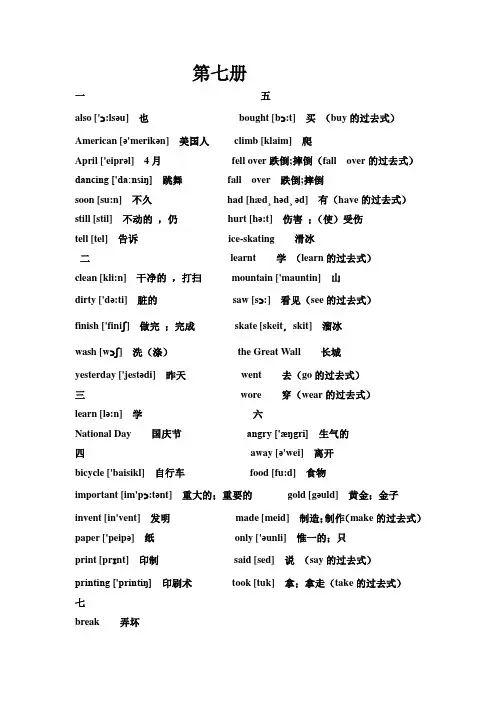
第七册一五also ['ɔ:lsəu] 也bought [bɔ:t] 买(buy的过去式)American [ə'merikən] 美国人climb [klaim] 爬April ['eiprəl] 4月fell over跌倒;摔倒(fall over的过去式)dancing ['da:nsiŋ] 跳舞fall over 跌倒;摔倒soon [su:n] 不久had [hæd¸ həd¸əd] 有(have的过去式)still [stil] 不动的,仍hurt [hə:t] 伤害;(使)受伤tell [tel] 告诉ice-skating 滑冰二learnt 学(learn的过去式)clean [kli:n] 干净的,打扫mountain ['mauntin] 山dirty ['də:ti] 脏的saw [sɔ:] 看见(see的过去式)finish ['finiʃ] 做完;完成skate [skeit¸skit] 溜冰wash [wɔʃ] 洗(涤)the Great Wall 长城yesterday ['jestədi] 昨天went 去(go的过去式)三wore 穿(wear的过去式)learn [lə:n] 学六National Day 国庆节angry ['æŋgri] 生气的四away [ə'wei] 离开bicycle ['baisikl] 自行车food [fu:d] 食物important [im'pɔ:tənt] 重大的;重要的gold [gəuld] 黄金;金子invent [in'vent] 发明made [meid] 制造;制作(make的过去式)paper ['peipə] 纸only ['əunli] 惟一的;只print [prɪnt] 印制said [sed] 说(say的过去式)printing ['printiŋ] 印刷术took [tuk] 拿;拿走(take的过去式)七break 弄坏cry [krai] 叫喊;哭monster ['mɔnstə] 怪物ran [ræn] 跑(run的过去式)八came [keim] 来(come的过去式)cup [kʌp] 茶杯;奖杯gold [gəuld] 黄金;金制的last [la:st] 最后的;刚过去的practise ['præktis] 练习win [win] 获胜;赢得won [wʌn] 获胜;赢得(win的过去式)九cut [kʌt] 切,割fell off 从……上跌落(fall off的过去式)finger ['fiŋgə] 手指happen ['hæpən] 发生knee [ni:] 膝盖put [pʌt] 放(put的过去式)ride [raid] 骑thirsty ['θə:sti] 口渴的watermelon ['wɔ:təmelən] 西瓜十fever ['fi:və] 发烧matter ['mætə] 要紧事;麻烦事medicine ['medsin¸-disin] 药toothache ['tu:θeɪk] 牙痛。
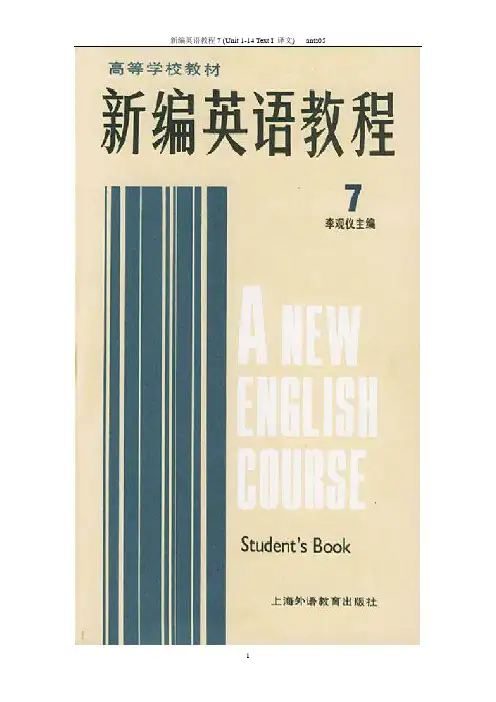
Unit One English and American Concepts of Space Edward T. Hall英国人和美国人的空间概念人们说英国人和美国人是被同一种语言分离开的两个伟大的民族。
英美民族之间的差异使得英语本身受到很多指责,然而,这些差异也许不应该过分归咎于语言,而应该更多的归因于其他层面上的交流:从使很多美国人感到做作的英式语音语调到以自我为中心的处理时间、空间和物品的不同方法。
如果说这世上有两种文化间的空间关系学的具体内容迥然不同,那就是在有教养(私立学校)的英国人和中产阶级的美国人之间了。
造成这种巨大差异的一个基本原因是在美国人们借助空间大小来对人或事加以分类,而在英国决定你身分的却是社会等级制度。
在美国,你的住址可以很好的暗示你的身分(这不仅适用于你的家庭住址,也适用于你的商业地址)。
住在纽波特和棕榈滩的人要比布鲁克林和迈阿密的人高贵时髦得多。
格林尼治和科德角与纽华克和迈阿密简直毫无类似之处。
座落在麦迪逊大道和花园大道的公司要比那些座落在第七大道和第八大道的公司更有情调。
街角办公室要比电梯旁或者长廊尽头的办公室更受尊敬。
而英国人是在社会等级制度下出生和成长的。
无论你在哪里看到他,他仍然是贵族,即便是在鱼贩摊位的柜台后面。
除了阶级差异,英国人和我们美国人在如何分配空间上也存在差异。
在美国长大的中产阶级美国人觉得自己有权拥有自己的房间,或者至少房间的一部分。
当我让我的美国研究对象画出自己理想的房间或办公室时,他们毫无例外的只画了自己的空间,而没有画其他人的地方。
当我要求他们画出他们现有的房间或办公室时,他们只画出他们共享房间里自己的那部分,然后在中间画一条分隔线。
无论是男性还是女性研究对象,都把厨房和主卧划归母亲或妻子的名下,而父亲的领地则是书房或休息室,如果有的话;要不然就是工场,地下室,或者有时仅仅是一张工作台或者是车库。
美国女性如果想独处,可以走进卧室、关上门。

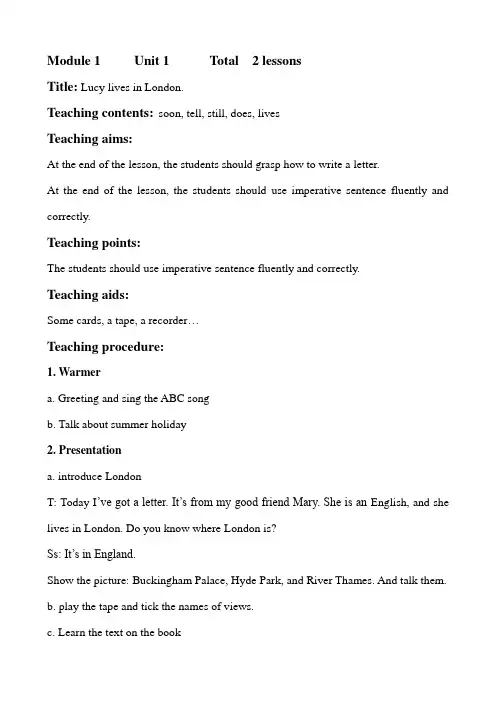
Module 1 Unit 1 T otal 2 lessonsTitle:Lucy lives in London.T eaching contents:soon, tell, still, does, livesT eaching aims:At the end of the lesson, the students should grasp how to write a letter.At the end of the lesson, the students should use imperative sentence fluently and correctly.T eaching points:The students should use imperative sentence fluently and correctly.T eaching aids:Some cards, a tape, a recorder…T eaching procedure:1. Warmera. Greeting and sing the ABC songb. Talk about summer holiday2. Presentationa. introduce LondonT: Today I’ve got a letter. It’s from my good friend Mary. She is an English, and she lives in London. Do you know where London is?Ss: It’s in England.Show the picture: Buckingham Palace, Hyde Park, and River Thames. And talk them.b. play the tape and tick the names of views.c. Learn the text on the bookT: Now, please open your books, turn to page2. Look at this picture, what’s that building? Can you guess?Ss: Buckingham Palace.T: Y es! Amy has go t a letter, too. It’s from her good friend Lucy. Lucy lives in London. Let’s listen and tick new words.d. learn new words by high and low voicewrite down the patterns: I—live she—lives he—livese. use “does”, “lives” to elicit “Where does he/she live? He/She lives in…”,game:Complete my sentences5、show the picture and see the sentences “It was my birthday on Saturday. We were at Buckingham Palace.” Show “was--is”,“were-- are”3. Practicea. Look at SB Unit1 Activity2. Listen and read, and then practice in pairs.Game: good actors. Invite some pairs to act the dialogue.b. Look at SB Unit1 Activity3. Look at the pictures, point and say “What’s he/ she doing?”, then answer. Teacher can give 5 minutes to students to practice. Blackboard designTips:Module 1 Unit 2 T otal 2 lessonsTitle:I’ve got a new friend.T eaching contents:soon, tell, still, does, livesT eaching aims:At the end of the lesson, the students should grasp how to write a letter.At the end of the lesson, the students should use imperative sentence fluently and correctly.T eaching points:The students should use imperative sentence fluently and correctly.T eaching aids:Some cards, a tape, a recorder…T eaching procedure:1. Warmera. greetings ( What’s the weather like? What’s your favourite fruit? )b. sing the ABC song.2. Presentationa. ask students “ Do you have foreign friends? Or how do you connect to them?”the answer may be telephone, e-mail or letternow today Amy write a letter to Lucy, let’s read the letterb. Listen and repeat.Listen to the tapeListen again, when you hear the new words and speak loudly.Let the students work in groups to learn the new words.One group reads the word, another group translates.3. Practicea. Have the students draw a picture of something they own. then work in pairs. They must take turns to guess the other students' pictureWrite these mixed up words on the board: Kunming, Zhengzhou, Guilin, WuhanTell the students that these are the names of some Chinese citiesNow have the students work in pairs.They have to put the letters in the correct order to make the wordsb. learn the form of the letter.Heading, Inside Address, Salutation, Body of the Letter, Complimentary Close, Signature, Postscript, EnclosureShortening:楼F(e.g. 2F) 巷Lane ( e.g. Lane 194) 段Section;Sec. (e.g. Sec.Ⅱ ) 弄Alley (e.g. Alley 6) 路Road;Rd.( e.g. Chunghua Rd.) 街Street;St.(e.g. Yangkwang St) Blackboard designTips:Module 2 Unit 1 T otal 2 lessonsTitle:I helped my mum.T eaching contents: yesterday finish dirty paint trousers finished phoned T eaching aims:At the end of the lesson, the students should know past a ctivities.At the end of the lesson, the students should learn English to help each other and learn from each other.T eaching points:The students should know past a ctivities.T eaching aids:Some cards, a tape, a recorder…T eaching procedure:1. Warmera. Say and do the actions.do my homework listen to music wash my socks play footballplay the violin wash my face clean my room play computer gamesb. Free talk(1) I watch TV every day. What do you do everyday?(2) say the day afer today“yesterday”2. Presentationa. Y esterday I did many things. Do you want to know?Y esterday I played the computer games. /d/ Y esterday I cleaned my room. /d/Y esterday I washed my socks. /t/ Pay attention here. I add the letters “ed”b. Please read these phrases again, but pay attention the letters “ed”E.g. listened to music washed my socks played football played the violin washed my face cleaned my room played computer games watched TVc. ask students:Y esterday I did these things. What did you do yesterday?The answer: I did my homework. Y esterday I finished my homework.On the blackboard: do—did finish—finishedT:Did you finish your homework? I’m sure you finished your homework yesterday.d. Game: Mime and say. Invite a student to come to the front, act without any voice and another should say behind him.Y esterday I -----ed. E.g. I watched my trousers. Play this game in the group.3. Practicea. Play a game: boys against girls.The all class say the sentences. The boy and the girl do the actions. Let’s have a look who is the first.b. Y esterday Lingling did many things. Can you guess?For example: Maybe she helped her mum. According to the face to decide right or wrong.Blackboard designTips:Module 2 Unit 2 T otal 2 lessonsTitle:Amy painted a picture.T eaching contents: yesterday finish dirty paint trousers finished phoned T eaching aims:At the end of the lesson, the students should know past activities.At the end of the lesson, the students should learn English to help each other and learn from each other.T eaching points:The students should know past activities.T eaching aids:Some cards, a tape, a recorder…T eaching procedure:1. Warmera. mime actionsdo my homework listen to music wash my socks play footballplay the violin wash my face clean my room play computer gamesb. Look and read the phrases: wash the trousers, clean the room, do the homework, help my mum.2. PresentationShow the pictures: paint a picture, cook noodles, watch TV, phone Grandmaa. Show the word cards and get the Ss to read the phrasephrases. (Write the phrases on Bb)b. Game: High and low voice.c. Show the pictures and the sentences:Y esterday, Mr Smart cooked noodles. Y esterday, Tom helped him. Y esterday, Ms Smart phoned Grandma.Y esterday, Sam watched TV. Y esterday, Amy painted a picture..Get the Ss read the sentences and write the sentences on Bb, use the red chalk to write “ed” and “yesterday”.d. Listen and point: Activity 2 in Unit 23. Practicea. T play the CD-Rom. Ss to listen to the Chant.: She painted a picture.b. Ss listen and repeat the chant.d. Finish the exercise 1 in Activity Books.Answers: (1) played (2) helped (3) listened (4) watched (5) finished (6) washed (7) painted (8) playede. Finish the exercise 2 in Activity Books. Listen first, then write.Blackboard designTips:Module 3 Unit 1 T otal 2 lessonsTitle:She didn’t walk to school yesterday.T eaching contents:National Day learn stay get up walk didn’t school half past sixT eaching aims:At the end of the lesson, the students should grasp past tense “didn’t . ”At the end of the lesson, the students should use the drills fluently and correctly.T eaching points:The students should grasp past tense “didn’t . ”T eaching aids:Some cards, a tape, a recorder…T eaching procedure:1. Warmera. Talk about the pictures.(See the courseware. Slide 1 )Today is Monday. Students can say a phrase or a sentence for each picture.b. Talk about Lingling. What does Lingling usually do on Mondays?( See the courseware. Slide 2) For each piture, students are required to say a sentence.c. Questions:What did Lingling do yesterday?What didn’t Lingling do yesterday?2. Presentationa. Listen to the recording and try to think about the two questions.1) Listen.2) Students find the answer and say.3) Join all the three sentences together and say.Ss: Lingling usually gets up at half past six on Monday. She usually walks to school. She usually learns English and Maths.Ss: Lingling didn’t get up at half past six yesterday. She didn’t walk to school yesterday. She didn’t learn English and Maths yesterday. Y este rday was National Day. Lingling watched TV and played with her toys.b. Then follow to read.Read together. Read in groups. Check some groups.3. Practicea. Listen and tick or cross.Y esterday, she played with her toys. She didn’t learn English and Mat hs.She watched TV. She didn’t go to school.She didn’t get up at 6:30.b. Practise. Point and say.Students say. Then write one sentence for each picture.Blackboard designTips:Module 3 Unit 2 T otal 2 lessonsTitle:I didn’t play football.T eaching contents:National Day learn stay get up walk didn’t school half past sixT eaching aims:At the end of the lesson, the students should grasp past tense “didn’t . ”At the end of the lesson, the students should use the drills fluently and correctly.T eaching points:The students should grasp past tense “didn’t . ”T eaching aids:Some cards, a tape, a recorder…T eaching procedure:1. Warmera. Enjoy a song “ Today is National Day! ”b. ask questions:What did she do ? What didn’t she do?c. Free talk: What do you usually do? Did you do it yesterday?d. Invite some student to read the text in front of the whole class. Each one one part.e. Check the spelling of the words in Modules 1,2,3.2. Presentationa. Listen and repeat.Group work and Group show.b. Invite some groups or individuals to the front to read or say the sentences.c. Look and say.Students read the sentences and try to fill in the blanks.Invite some students to read the sentences. One by one. Spell the words.Read together.3. Practicea. Listen and say. Then sing.Today is National Day. I din’t go to school today. I stayed at home. I talked on the phone. And I walked to the park to play.(Substitution practice) Y esterday was National Day. …b. pay attention to the change: play — plays ride---ridesc. fill in the blankUse the sentences:I usually _________. But I didn ’ t__________yesterday.An activity:Sa : “ I usually_______.But I didn ’ t____________. ”Sb: “ Sa usually_______.But he/she didn ’ t____________. ”Blackboard designTips:Module 4 Unit 1 T otal 2 lessonsTitle:Chinese people invented paper.T eaching contents:important bicycle printing print Chinese invent paper people newspaperT eaching aims:At the end of the lesson, the students should practise the pass word.At the end of the lesson, the students should know the important inventions.T eaching points:The students should practise the pass word.T eaching aids:Some cards, a tape, a recorder…T eaching procedure:1. Warmera. Enjoy a song “ Today is National Day! ”b. act finding important things to elicit “ important ” and ask students what’s your important thing.c. Where is my phone? It’s very important for me. I can phone my mother, my mother is very important for me.d. What is important for you (in our lives)?2. Presentationa. let students to explain “newspaper”,and elicit “Chinese/English people”T: Books are made of paper. Show some things:paper/telephone/boat/planeT:.Look,some important news on this paper. Show the newspaper.Game: Chinese or English newspaper.b. let students know who invented the paper.Chinese people invented paper.c. T: Who is he? What do you know about him?Learn “invent”—invented ed/id/ want—wanted painted—painted c. Cailun invented paper.Chinese people invented paper. Chinese people are very clever. Exchange into kites/chopsticks: People invented …….3. Practicea. Listen and find out the word “invented”b. Listen and repeat the sentences with “ invented ”c. Read and finish the sentences.do some exercises .d. show some things: TV phone kite bike…T:.Who invented bicycles? Chinese people didn’t invent …….Let students know how to use “didn’t”e. Guess and choose:Which thing was invented by Chinese people? Blackboard designTips:Module 4 Unit 2 T otal 2 lessonsTitle:He invented this bicycle in 1839.T eaching contents:important bicycle printing print Chinese invent paper people newspaperT eaching aims:At the end of the lesson, the students should practise the pass word.At the end of the lesson, the students should know the important inventions.T eaching points:The students should practise the pass word.T eaching aids:Some cards, a tape, a recorder…T eaching procedure:1. Warmera. matched treeshow some verbs with different forms, students should the correct words.b. ChantInvent invent invented Chinese people invented paper.Print print printed I printed this newspaper.2. Presentationa. new wordsT: What did you do yesterday? S:……T :I rode my bicycle yesterday. Look,this is my bicycle. show the word:bicycle。
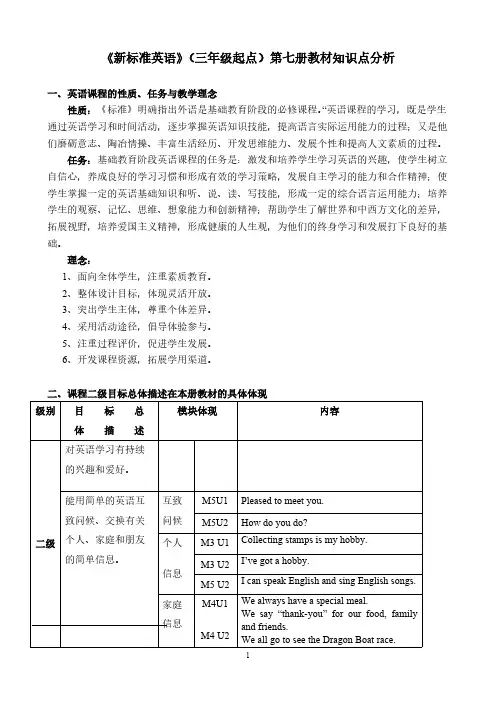
新标准英语第七册
Module 1---Module 6
一、补全单词并译成汉语(20分)
1、ch pst cks
2、s n
3、kn f
4、f k
5、s m day
6、p stc rd
7、fr m 8、fr nd
9、s nd 10、Am r ca
二、从II栏中找出A栏中词组的汉语意思,并将其字母代号填入题前括号(20分)
()1、a Chinese kite A、要成为
()2、live in New York B、一个中国风筝
()3、want to be C、给我写信
()4、write to me D、住在纽约
()5、want to visit china E、我的朋友
()6、a postcard from Canada F、笔友
()7、my friend G、一个关于美国的书
()8、a book about America H、在英国
()9、in England I、一张加拿大明信片
()10、pen friends J、要访问中国
三、选词填写,并将代号填入句首括号内(20分)
()1、you got a kite? (A、Have B、Has)
()2、She a postcard. (A、have got B、has got)
()3、Amy’s father three brothers. (A、have got B、has got) ()4、Daming’s mother has brothers.(A、a B、two)
()5、I some chopsticks.(A、have got B、has got)
()6、We fly the kites the park. (A、in B、on) ()7、Daming my friend. (A、is B、are)
()8、She’s got email. (A、a B、an)
()9、I got a football. (A、haven’t B、hasn’t)
()10、Chopsticks difficult. (A、is B、are)
四、用“and”或“but”连接句子(20分)
1、Tom has got a book it’s about America.
2、Daming got a letter from French he can’t read it.
3、I’ve got a ruler I’m using it.
4、Sam lives in Beijing he’s not Chinese.
5、I’ve got a chopsticks they are difficult.
五、给你的朋友写一张明信片(20分)。